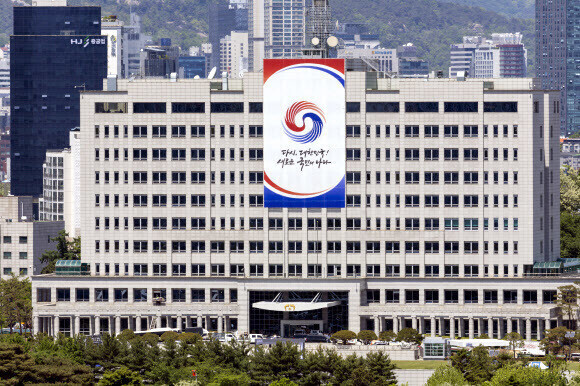hankyoreh
Links to other country sites 다른 나라 사이트 링크
S. Korean court gives anti-discrimination march OK to pass in front of Yoon’s office

A court has allowed a protest march to proceed in front of the presidential office in Seoul’s Yongsan District.
The decision puts a curb on attempts by police to automatically ban protests and assemblies “within 100 meters of the presidential residence” even after recently inaugurated President Yoon Suk-yeol relocated his presidential office from the Blue House to Yongsan.
With the court stating in unmistakable terms that the office was not considered part of the presidential residence, observers are predicting that most assemblies and demonstrations nearby could be permitted, provided that they pose no issues in terms of the president’s security.
The 5th administration division of the Seoul Administrative Court under Judge Kim Sun-yeol ruled on Wednesday to partially grant a request submitted by Rainbow Action, a coalition of groups opposing discrimination against sexual and gender minorities, to the chief of the Seoul Yongsan Police Station, asking for the suspension of measures barring demonstration participants from marching near the presidential office.
In its ruling, the court said, “In view of the legislative aims and purpose of the Assembly and Demonstration Act, it appears to fall outside the conventionally accepted meaning to interpret the presidential office as being included in the presidential residence.”
“There is ample possibility of viewing the outright barring of even demonstrations that pose no demonstrable clear and present concerns of infringing the public order as being an excessive restriction on the freedom of assembly,” it concluded.
While it did add the condition that demonstrations would need to “pass by promptly within an hour and a half,” the court effectively granted full permission, without placing restrictions on the number of marchers or the area where they would be allowed to march.
On April 19, Rainbow Action submitted an assembly noticing to the Yongsan Police Station announcing that 500 people planned to march over a 2.5-kilometer course from the plaza at Yongsan Station to a plaza in Itaewon on May 14 to mark the International Day Against Homophobia, Biphobia, Intersexphobia and Transphobia on May 17.
In response, police moved to prohibit the march on the grounds that a portion of the course fell within 100 meters of the presidential office. The Assembly and Demonstration Act includes a provision stating that assemblies and demonstrations are barred within 100 meters of the “Presidential residence.”
But the court made it clear that the presidential office and presidential residence represented two distinct concepts.
After the court issued its ruling, Rainbow Action called it “highly significant in recognizing the unlawfulness of the police’s authoritative interpretation that the presidential office was included within the scope of the presidential residence, and in guaranteeing the right to hold assemblies near the presidential office.”
But an official with the National Police Agency’s bureau of intelligence on public peace and security said, “Since the court’s decision amounted to an injunction, we’ll need to wait and see what happens with a ruling on the merits.”
“When it comes to whether to allow other assemblies and demonstrations that have already been prohibited, we’ll have to make judgments based on individual consideration of the place and course,” it added.
By Shin Min-jung, staff reporter
Please direct questions or comments to [english@hani.co.kr]

Editorial・opinion
![[Column] The state is back — but is it in business? [Column] The state is back — but is it in business?](https://flexible.img.hani.co.kr/flexible/normal/500/300/imgdb/original/2024/0506/8217149564092725.jpg) [Column] The state is back — but is it in business?
[Column] The state is back — but is it in business?![[Column] Life on our Trisolaris [Column] Life on our Trisolaris](https://flexible.img.hani.co.kr/flexible/normal/500/300/imgdb/original/2024/0505/4817148682278544.jpg) [Column] Life on our Trisolaris
[Column] Life on our Trisolaris- [Editorial] Penalties for airing allegations against Korea’s first lady endanger free press
- [Editorial] Yoon must halt procurement of SM-3 interceptor missiles
- [Guest essay] Maybe Korea’s rapid population decline is an opportunity, not a crisis
- [Column] Can Yoon steer diplomacy with Russia, China back on track?
- [Column] Season 2 of special prosecutor probe may be coming to Korea soon
- [Column] Park Geun-hye déjà vu in Yoon Suk-yeol
- [Editorial] New weight of N. Korea’s nuclear threats makes dialogue all the more urgent
- [Guest essay] The real reason Korea’s new right wants to dub Rhee a founding father
Most viewed articles
- 1[Column] Why Korea’s hard right is fated to lose
- 260% of young Koreans see no need to have kids after marriage
- 3Amid US-China clash, Korea must remember its failures in the 19th century, advises scholar
- 4[Column] The state is back — but is it in business?
- 5Japan says it’s not pressuring Naver to sell Line, but Korean insiders say otherwise
- 6AI is catching up with humans at a ‘shocking’ rate
- 7S. Korean chaebols comprise 84% of GDP but only 10% of jobs
- 8Hybe-Ador dispute shines light on pervasive issues behind K-pop’s tidy facade
- 9[Column] Life on our Trisolaris
- 10[Reportage] New funeral culture taking hold in South Korea